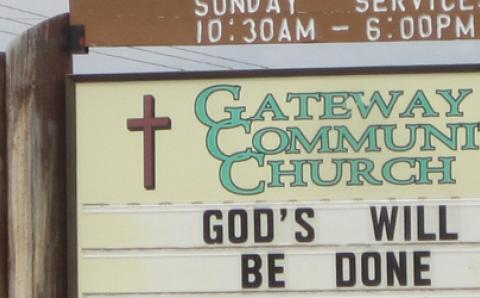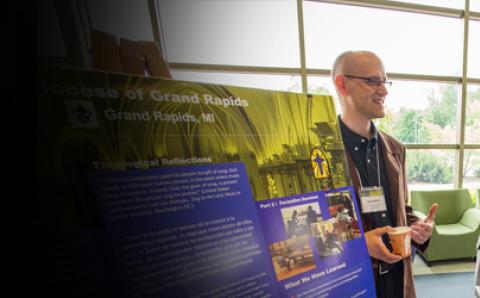“Lord,” we prayed, “these immigrants came to our English as a Second Language (ESL) classes, and now they attend our Sunday morning worship. But ecclesiastical ‘church’ words are not in the first-level ESL texts. What do you want us to do?”
Forty years ago we named ourselves Church of the Servant (COS); the multicolored building where we worship deliberately illustrates the church enfolding many people groups. We know that the Scriptures call us to offer hospitality toward the foreigner and welcome the stranger within our gates. We know that Christ is the model of servant hospitality. He asks his followers to help the poor. He models conversations with women and befriends them—like the Samaritan woman at the West Bank well. Jesus himself is the immigrant.
Influence of Cultural Shifts
In his new book From Times Square to Timbuktu, Wes Granberg-Michaelson, an elder at COS, describes the scriptural focus on hospitality. Further, he notes how cultural shifts in global Christianity influence North American churches.
We recognized these modern forcescoming to COS with the arrival of people from various countries needing refuge, needing to learn English as a second language, needing homes and friends. We meet each other in our mobile food pantry, in ESL classes, in our homes.
And so we asked, What does that mean for worship at COS? With prayer and daring we tried a unique experiment: offering two kinds of services. One is a standard service for people familiar with the language and its metaphors. The other, which meets at the same time, is a Basic English service—in part for worshipers new to the language, and also for people who prefer the spirituality of an international community.
A goal of the Basic English service is to worship in Christian community—to care for each other as Christ’s family on earth. To be a Christian, we believe, is to be a community person.
In the Basic English service, relationships with newfound friends and understanding of God’s love continue to grow. Pictures embellish and replace words for people with no English. People from as many as 16 different countries participate in any given service of about 100 Basic English worshipers. The majority are Christians, but some are Hindus, Muslims, or Buddhists considering what it is to follow Christ.
How do immigrants approach that in a new culture? Some attempt to bring the culture of their original country with them and transplant their traditions. Others embrace the new and let go of the old. Most people follow a blend somewhere in between. The Basic English services are home for them.
Unity through One Body
We want to promote unity in the church. So we sometimes plan combined worship services for the whole church in Basic English. Our worshiping together encourages sharing, and sharing enhances worship. Prayers in the whole church become more global; worshipers develop understanding and commitment.
Professions of faith take place in these combined services. In one of those services, Jestina and Ingel Tucker, young girls who are Christian immigrants from Liberia, professed their faith to the whole church. Today they read Scripture, work with children, and assist with the sound system. The combined congregations spontaneously clapped when Prasad and Lal Rai professed their new faith in Christ. Now the brothers have leadership roles in collecting money as well as translating, transporting, and serving on advisory committees.
Fran Mavindi plays African drums. She is a liturgist and leads the intercessory prayer. Rev. Mitogo Opira and Rev. Eric Sarwar, among others, preach.
Still, we wondered how people from different nations could build even stronger relationships with each other at COS. How about in discovering our universal humanness through photos and stories?
No matter what country we come from, we all know children who are sometimes funny and others who sometimes try to demand unnecessary attention. We suffer from 21st-century overload when we work too hard. Sometimes we find it difficult to make decisions. We all laugh and we all cry. People from differing cultures have opportunities for global learning. And all of us learn from the grit and perseverance of first-generation refugees.
In Spring 2014 we unveiled a photography exhibition and collection of stories called “All One Body.” This exhibition encourages and celebrates our unity and our ability to obey Jesus with joy. Dan Davis’s sensitive photographs of recently arrived families and their corresponding catalog of stories convey sorrow and humor, energy and community. These pictures of faces, we hoped, would lead to more face-to-face encounters among people who attend either Basic English or standard services. These encounters build the community of believers and allow a foretaste of heaven.
Storywriters accompanied Dan on each photo shoot. I, for one, learned that Kim Siam and Pau Thang are Christians because of the witness of a Christian family who went to Burma 100 years ago. Their story reminds me of the thrilling fact that we trust the same God who helped Kim self-deliver her first baby at home in Malaysia under fierce circumstances.
Prasad Rai’s story makes me think about what it’s like to visit friends in a North American culture. Do you expect people to call ahead before they come over? Why? Prasad talks of going to visit friends in Bhutan, finding them gone, but then daring to eat food from their table without asking. He and many immigrants have experienced a richly relational community—more often than Westerners typically do.
Open your gates to the stranger, God says, and the King of Glory will come in. Why would Dan want to photograph our immigrant friends in their own homes, doing their own thing? Why would we post their stories next to their photos for an exhibit in the COS Artery? And what stories do Dan’s large photos of church octogenarians we’ve displayed in the church café tell? Older people are sometimes informative strangers—even to themselves.
When we know and care for each other, we begin to understand our differences and enjoy our likenesses.
Thanks be to God for bringing a prophet-photographer and storytellers to help us swing wide the gates—to open ourselves to new relationships and to let the King of Glory come in!
Related article:
Worship in Basic English Draws Immigrants and Refugees
Amelia’s Miracle
Amelia Maleck’s strength is evidenced in her miraculous escape from Liberian rebels, in her four children, and in her ability to adapt to the culture of the United States in 10 years. How does she do it?
At her home, the answer is evident. She and her children, Jestina, 16; Ingel, 12; and Lebron, 4, trust in God! An older daughter, Sarah, remains in Africa. Sitting around the neat dining room table with Jestina, Ingel, and Lebron, we shared in the family’s happy banter. On the walls hang images of Christ, reflecting Amelia’s life in the Catholic Church.
Amelia was only 13 years old when Charles Taylor’s Liberian rebels broke into their house, shooting. A cousin standing next to Amelia was shot. Then the one female rebel told the others not to shoot Amelia.
“I believe in miracles,” says Amelia. “I wasn’t killed but escaped. I walked by myself to Ivory Coast. It was a miracle of God!”
For the next 13 years, Amelia lived in a United Nations refugee camp. After two years she found her mother. At the camp, Sarah, Jestina, and Ingel were born. The family got food brought on UN trucks. These days they sometimes get food brought by truck from the COS Mobile Food Pantry.
When she had an opportunity to immigrate to the United States, Amelia made the journey with two of the girls. Jestina was 6 and Ingel 3 when they took their first plane ride. Jestina remembers the good-smelling soap in a hotel.
Now the family attends the Basic English service at Church of the Servant. Amelia works in a car parts factory. COS members Dan and Cindy Davis are steady supporters.
Imagine how rewarding it must have been for Adam Van Gelder, on his first Sunday preaching at the Basic English service, to hear Amelia say, “I want to thank God for that good sermon.” Another time, her petition was, “I would like God to help me to come to church every Sunday.” Since then we have seen Amelia in church more often.
Ingel and Jestina are loyal worshipers. Ingel attends Ridge Park Academy and Jestina goes to West Michigan Aviation Academy. They frequently read Scripture, help with the microphone, and participate in youth activities. Lebron goes to Little Lambs.
Food from the Table
Dried marigold blossoms outline the doorways to the Rai home. Lachuman Rai was a successful farmer in Bhutan before his family was forced to move back to Nepal. The family walked for a day and a half to a riverbank, where they lived under plastic tents for six months before being taken in by the United Nations in Nepal.
Twenty years later, mother Phul Maya still cooks with food the family grows in their garden—now at their Forest Hills home. She also makes good chaiya (sweet tea). Lachuman still collects rainwater from the roof to water the family’s healthy garden.
Sons Prasad and Lal were teachers in the camps in Nepal. After four years in America, both have supervisory jobs in local factories and also attend Grand Rapids Community College. And they are worship leaders in the Basic English service. Prasad sings, plays drums, leads prayers, and translates often; Lal helps with video and audio projections and shares advice when asked. They’ve come a long way from the riverbank!
Prativa, their 12-year-old sister, is a fifth-grader and attends Girls Club at COS. She came to the U.S. with her parents more than a year after Lal and Prasad’s arrival. She giggles when she realizes that she is growing tallest in her family.
Asked what is most different in their lives now living in the United States, Prasad answers philosophically: “Talking with people—and it’s not just language. Here is it a different social life. We are always busy. We don’t have time to be together.
“In Bhutan, we knew everyone. In the countryside, houses were not close together, but people were together. We could just go into a friend’s house and get food from the table even if people weren’t home.”
The Rai family does not borrow food from others’ tables in Grand Rapids. But despite their American busyness, they share the Bread of Life each week with the growing international community at the Basic English service.
Burma to Burton
“Determination” describes Kim and Pau’s activities at Church of the Servant. They come to ESL classes faithfully. Even in the face of the oncoming birth of Mung Pi and the care of her daughter, Vang Huai Pi, Kim boarded two buses each way—even in the dark—to go to ESL classes and to care for the family garden at COS. Then Kim and Pau began coming to the Basic English services.
Kim’s strong singing voice led people to invite her to sing with the service’s lead singers. While Kim sings, Pau lovingly cares for the children. Kim is also a song leader in the Karen worship service the family attends after Basic English service each Sunday. That’s nothing new: she was also a worship leader in her church in Burma.
Pau grew up a Christian in Burma, where his father is still the minister of a church. He married Kim in Burma. In 2007 Pau fled to Malaysia, where he sought refuge from oppression. He sent for Kim in 2009, and she lived in their house for two years. During that time she could not leave the house because she was not in Malaysia legally. In that house their daughter was born. They emigrated to the United States in 2011.
Now Pau commutes daily to his job at a meat processing plant in Plainwell.
In the bitter cold winter of 2014, Kim and Pau bought a house in Grand Rapids, taking classes in the process of home ownership at Inner City Christian Fellowship. So many papers have to be filled out, signed, filed, and kept, says Pau. Chuck and Barbara Hampton of COS helped Kim and Pau face the challenges and expectations of buying that home.
Those who attend the Basic English Service appreciate the Christian background from which Kim and Pau come. One Baptist missionary family introduced the Karen people in Burma to Christianity 100 years ago. Now the Baptists survive among the Christians in Burma. Kim and Pau’s story is an example of what a family working with the Lord can do!
From Civil War to New Life
Rising from their old life among the bombs of civil war in Sri Lanka, Dharma, Thara, and Mithu Thuraisengam maintain the pluck and courage they used to escape death and seek a new life in Grand Rapids.
When asked why the family left their warm island nation for our sometimes cold climate, Dharma responds without hesitation. “They were killing people—even in our homes! One July 7, the army came to our parents’ house and kidnapped my father. We cannot find where they took him. We don’t know if he is dead or alive.”
Dharma and his brothers left Sri Lanka in stages. For a time one lived in Qatar; today another brother lives in Indonesia. Their mother remains in the Sri Lankan family home.
Carrying steaming tea with hot milk to the table in their main-floor apartment less than a mile from COS, Thara interrupts her husband’s story. Through the window, their son, Mithu, 4, eagerly greets a friendly squirrel—a regular visitor.
Thara and Dharma married on August 29, 2009. Soon after, they fled to Thailand, where Dharma had a three-month visa. Eventually Dharma was arrested, and for the next four-and-a-half years, the family spent time in and out of jail as undocumented aliens in Thailand. Mithu spent his early childhood in horrid apartments or jails.
“We met Seelan and Pavany and Santan in Thai prisons,” offers Thara. “Now in the year-and-a-half since we came to the U.S., we have welcomed five other Sri Lankan families.”
Dharma and Thara are the nucleus of a community that is larger than just their fellow Sri Lankans. When they host Mithu’s birthday parties, more people from countries other than Sri Lanka come. They help neighbor Chenda Sat, another immigrant, as often as their work schedules allow.
Hard work is a way of life for this family. Thara works from 11 p.m. to 7 a.m. for a car parts manufacturing company. She also cares for international children in the nursery of our COS English as a Second Language program four times a week. She drew several faces on the Pentecost collage/mural in the Basic English Service.
Dharma, who worked as a welder in Sri Lanka and would like to do so here, works for another company. He also works part time at an international grocery store. In the summer, the couple shares their harvest from the COS community garden or their own tiny plot behind their apartment.
“Learning English is hard/easy/so-so,” says Dharma optimistically as he sits back to answer a question. Meanwhile, Headstart student Mithu jumps over the toy structure that he had built. When not talking to squirrels or entertaining visitors, this 4-year-old scurries under the table into his favorite hideaway filled with toys.
Dharma and Thara’s story prompts us to ask what we can learn from them and their transplanted Sri Lankan community about showing and feeling God’s love—about being as hospitable to them as they are to so many others.
About the Author
Helen Bonzelaar is professor of art emerita at Calvin College, Grand Rapids, Mich., and is retiring as chair of the Basic English Service at Church of the Servant, Grand Rapids.







